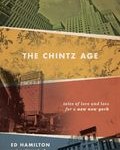 Ed Hamilton is the author of Legends of the Chelsea Hotel: Living with the Artists and Outlaws of New York’s Rebel Mecca (Da Capo, 2007). His fiction has appeared in various journals, including: Limestone Journal, The Journal of Kentucky Studies, River Walk Journal, Exquisite Corpse, Modern Drunkard, and, most recently, in Omphalos, Bohemia, Penduline Press, and in translation in Czechoslovakia’s Host.
Ed Hamilton is the author of Legends of the Chelsea Hotel: Living with the Artists and Outlaws of New York’s Rebel Mecca (Da Capo, 2007). His fiction has appeared in various journals, including: Limestone Journal, The Journal of Kentucky Studies, River Walk Journal, Exquisite Corpse, Modern Drunkard, and, most recently, in Omphalos, Bohemia, Penduline Press, and in translation in Czechoslovakia’s Host.
Ed, your excerpted story here, “A Bowery Romance,” is part of a themed collection—The Chintz Age: Tales of Love and Loss for a New New York. What inspired the project? Did it evolve over time or was it something you had your sights on from the very first story?
The stories in Chintz Age are about people in the arts who are struggling to maintain relevance in a world that’s becoming increasingly indifferent, and sometimes openly hostile, to their work and even to their very existence. For it seems that the world— especially the U.S., and even more so New York—has become, to a frightening and disorienting degree, all about money and power, while values such as truth, beauty, and personal integrity are shrugged off with a laugh.
At the Chelsea Hotel I live among artists, musicians, dancers, photographers, and people in various other creative fields, and I myself am a writer, so I’m quite familiar with this struggle. For many years, we at the Chelsea were in effect insulated from the pressures of the outside world, monetary and otherwise, but then the hotel was taken over by developers intent on evicting the artists and turning the place into a fancy boutique hotel.
Seeing my beloved arts hotel (124 years as such!) transformed into a construction site, and seeing many of my longtime friends and neighbors unceremoniously thrown out into the street, was what inspired Chintz Age. After the initial upheaval, which coincided with the publication of my first book, Legends of the Chelsea Hotel, I labored for many years to come to terms with the personal dimension of the tragedy that had engulfed us. I went through numerous attempts to write non-fiction stories about the people and issues involved, setting the stories in the Chelsea itself, but I always found that I was too close to the action—which is, actually, still ongoing—too emotionally engaged with the people I was trying to write about. In order to write objectively, I had to take a step back from the hotel, setting the stories elsewhere, and using fictional characters to dramatize them.
So, appropriately, a book about the creative struggle is itself the result of a creative struggle.

